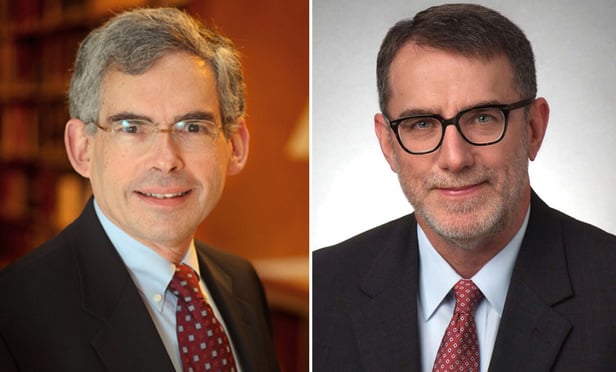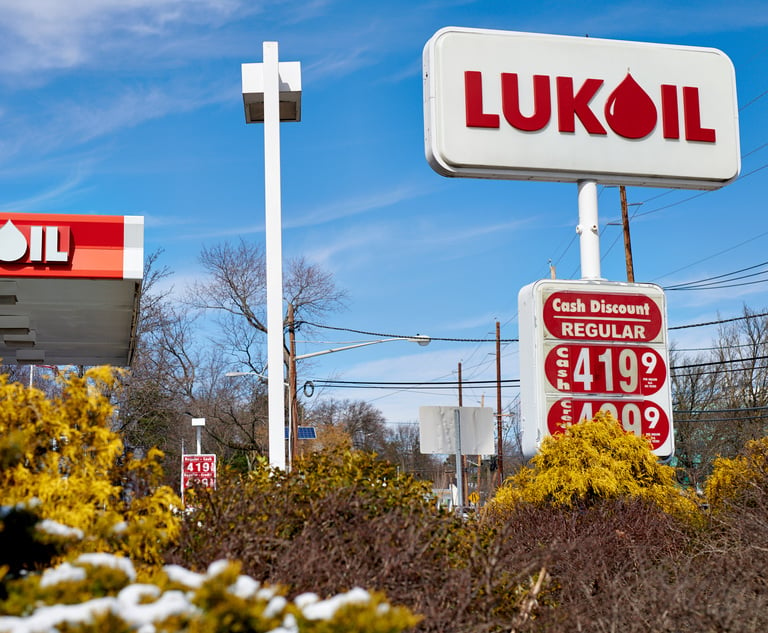New York Environmental Legislation in 2019
In 2019, with the Democrats newly in full control of the State Senate, the Assembly and the Governor's office, New York adopted more environmental legislation than it had in more than a decade. In this edition of their Environmental Law column, Michael Gerrard and Edward McTiernan report on these developments and numerous other laws targeting environmental concerns.
January 08, 2020 at 12:45 PM
9 minute read
 Michael B. Gerrard and Edward McTiernan
Michael B. Gerrard and Edward McTiernan
In 2019, with the Democrats newly in full control of the State Senate, the Assembly and the Governor's office, New York adopted more environmental legislation than it had in more than a decade. This included a sweeping climate change statute, a new environmental justice article in the Environmental Conservation Law, and a statewide ban on plastic carryout bags. This annual survey reports on these developments and numerous other laws targeting environmental concerns.
Climate Change and Energy
In July, New York enacted the Climate Leadership and Community Protection Act (CLCPA) (Chapter 106), which set statewide greenhouse gas emissions limits of 60% of 1990 emissions by 2030 and 15% of 1990 emissions by 2050. The governor's signing in December of an environmental justice bill (discussed below) triggered a Jan. 1, 2020 effective date for CLCPA, setting deadlines for many of its interim requirements. The Department of Environmental Conservation (DEC) must promulgate regulations by Jan. 1, 2024 to achieve CLCPA's emissions limits. A scoping plan developed by a 22-member Climate Action Council will inform those regulations. The draft scoping plan is due by Jan. 1, 2022, and the final plan by Jan. 1, 2023. DEC, the New York State Energy Research and Development Authority (NYSERDA), and the Public Service Commission (PSC) have many other duties under CLCPA, including setting a social cost of carbon for use by state agencies, establishing a renewable energy program to achieve zero emissions from electricity by 2040, and creating programs to meet statutory targets for offshore wind generation, photovoltaic generation, and energy storage. CLCPA also contains "just transition" and climate justice provisions. We discussed CLCPA's implications for the electric system, transportation, and buildings in our July column.
Smaller-scale renewable energy and energy efficiency measures were also passed, including budget bill provisions for a renewable energy and energy efficiency program in Westchester County (Chapter 58, Part UU) and for property tax advantages for real property that hosts certain renewable energy and energy storage systems (Chapter 59, Part AA). The governor vetoed a bill that would have required the PSC to establish a renewable energy credit program that compensated existing large-scale renewable energy generators on a "noncompetitive" basis (S23). The governor instead directed the Department of Public Service and NYSERDA to design a competitive program for existing renewable sources.
In December, Gov. Andrew Cuomo signed two laws related to electric vehicles (EVs), one that eases the way for installing and using EV charging stations at condominiums (Chapter 597) and another that directs NYSERDA to prepare a report on EV issues (Chapter 676). Another law requires annual reporting on energy efficiency standards for certain appliances and equipment (Chapter 666).
New York also enacted a law prohibiting offshore oil and gas drilling and certain related activities in New York coastal areas (Chapter 29).
In addition, New York enacted a law promoting climate change adaptation by granting municipalities power to authorize transfers of development rights to protect lands at risk from sea level rise, storm surge, or flooding (Chapter 502).
Environmental Justice
Another major environmental measure adopted in 2019 was the addition of a new environmental justice (EJ) article to the Environmental Conservation Law. The law (Chapter 735) sets forth EJ principles and requires a 17-member Permanent Environmental Justice Advisory Group to develop a model EJ policy. State agencies must develop and "be guided" by EJ policies and must appoint EJ coordinators and develop EJ training plans.
Congestion Pricing
The annual budget required the establishment of a "central business district tolling program" south of and including 60th Street in Manhattan. The program is to start in 2021 and is intended to reduce traffic and generate $15 billion for Metropolitan Transportation Authority capital projects (Chapter 59, Part ZZZ). Further details about congestion pricing can be found in our May 2019 column.
Chemical Substances and Pesticides
On December 30, a bill (S501) that would establish a comprehensive program to regulate toxic chemicals in children's products was delivered to Governor Cuomo. The governor had not taken action on the bill as of January 5, but already in 2019 he had signed a number of laws regulating chemical substances. The laws include restrictions on firefighting foams containing perfluoroalkyl and polyfluoroalkyl substances (PFAS) (Chapter 702); a prohibition on the sale of household cleansing, cosmetic, and personal care products containing more than trace concentrations of 1,4-dioxane (Chapter 613); a prohibition on the sale of lamps unless they meet mercury content standards (Chapter 647); a ban on the installation of mercury-containing floors in schools (Chapter 565); and a warning label requirement for children's jewelry containing lead (Chapter 671). In addition, the budget legislation redefined "elevated lead levels" in the Public Health Law to mean a blood lead level greater than or equal to five micrograms of lead per deciliter of whole blood (reduced from 10 micrograms) (Chapter 57, Part P). Another new law requires ingredient labeling for menstrual products (Chapter 362).
The governor vetoed a ban on the pesticide chlorpyrifos (S5343), saying that a pesticide should not be banned "by legislative decree." He instead directed DEC to "take immediate action" to ban aerial spraying of chlorpyrifos and to ban all uses "as soon as possible."
Solid Waste
The budget legislation included the New York State Bag Waste Reduction Act, which bans entities that collect sales tax from distributing plastic carryout bags starting on March 1, 2020 (Chapter 58, Part H). In addition, the budget legislation included measures to reduce organic waste in landfills (Chapter 58, Part SS).
Other laws addressing solid waste issues included the Finger Lakes Community Preservation Act, which restricts incineration facilities within the Oswego River/Finger Lakes Watershed (Chapter 32); a budget law provision extending certain Waste Tire Management and Recycling Act of 2003 provisions (Chapter 58, Part E); and a law establishing a postconsumer paint collection program (Chapter 673).
Water
In anticipation of state drinking water standards for certain PFAS and 1,4-dioxane, a law enacted in November created a new statute of limitations (CPLR 214-h) for civil actions brought by public or wholesale water suppliers to recover damages for injury to property resulting from the presence of a contaminant in a water supply source (Chapter 442). Other water supply- and conservation-related measures included more stringent water efficiency standards for plumbing fixtures (Chapter 578); lead pipe disclosure requirements (Chapter 57, Part P); and requirements that DEC post information about water withdrawal permits for public water supplies (Chapter 458).
Parks, Wildlife and Natural Resources
In December, the governor signed a law (Chapter 661) establishing a Marine Mammal and Sea Turtle Protection Area around Plum Island, Great Gull Island, and Little Gull Island. New York also enacted a law giving DEC authority to designate otherwise unprotected species as "vulnerable" and directing DEC to designate giraffes as a vulnerable species within 180 days (Chapter 651). The law prohibits the sale of articles made from vulnerable species. Another law extended a 2014 law aimed at preventing the spread of aquatic invasive species (Chapter 81).
A law enacted in September identified two parcels—one in the Catskills and the other in the Adirondacks—for addition to the Forest Preserve (Chapter 287) to satisfy a condition of a 2017 amendment to the New York Constitution that provided for a 250-acre health and safety land account in the Forest Preserve. Other 2019 laws required the Office of Parks, Recreation and Historic Preservation (OPRHP) to prepare a report providing the justification for the permanent closure of any park or historic site at least six months in advance of closure (Chapter 585); required DEC to report on funding to facilitate disabled access to facilities owned or managed by DEC or OPRHP (Chapter 546); and directed OPRHP to prepare a plan for "a comprehensive statewide system of non-motorized multi-use trails" for use by bicyclists, pedestrians, and other non-motorized users (Chapter 516).
Miscellaneous
Other environmental measures enacted in 2019 included extension of the moratorium on liquefied natural gas (LNG) facilities and transportation routes in New York City (Chapter 48); extension of the Commissioner of Education's authority to regulate school vehicle idling on school grounds (Chapter 49); and extension of a provision allowing New York City and Suffolk and Nassau Counties to retain 25% of fines collected in their Bottle Bill enforcement (Chapter 65).
Other laws amended provisions concerning pollinator-friendly land management practices for solar energy generators and others (Chapter 203) and extended and enhanced New York City's green roof tax abatement program (Chapter 79).
In addition, a new law establishing a regulatory framework for the production and sale of hemp and hemp extract (Chapter 614) provides for the Department of Agriculture and Markets to promulgate regulations that include environmental standards for hemp extract production.
Michael B. Gerrard is a professor and director of the Sabin Center for Climate Change Law at Columbia Law School, and senior counsel to Arnold & Porter. Edward McTiernan, formerly general counsel of the New York State Department of Environmental Conservation, is a partner with Arnold & Porter. L. Margaret Barry of Arnold & Porter assisted in the preparation of this article.
This content has been archived. It is available through our partners, LexisNexis® and Bloomberg Law.
To view this content, please continue to their sites.
Not a Lexis Subscriber?
Subscribe Now
Not a Bloomberg Law Subscriber?
Subscribe Now
NOT FOR REPRINT
© 2025 ALM Global, LLC, All Rights Reserved. Request academic re-use from www.copyright.com. All other uses, submit a request to [email protected]. For more information visit Asset & Logo Licensing.
You Might Like
View All
Oil Co. Alleges Plot to Drive Away Competition in NYC's Liquid Fuel Market
3 minute read

GE Agrees to $362.5M Deal to End Shareholder Claims Over Power, Insurance Risks
2 minute read
Lukoil Pan Americas Sues Investment Firm Over Alleged $18 Million Breach
Trending Stories
Who Got The Work
J. Brugh Lower of Gibbons has entered an appearance for industrial equipment supplier Devco Corporation in a pending trademark infringement lawsuit. The suit, accusing the defendant of selling knock-off Graco products, was filed Dec. 18 in New Jersey District Court by Rivkin Radler on behalf of Graco Inc. and Graco Minnesota. The case, assigned to U.S. District Judge Zahid N. Quraishi, is 3:24-cv-11294, Graco Inc. et al v. Devco Corporation.
Who Got The Work
Rebecca Maller-Stein and Kent A. Yalowitz of Arnold & Porter Kaye Scholer have entered their appearances for Hanaco Venture Capital and its executives, Lior Prosor and David Frankel, in a pending securities lawsuit. The action, filed on Dec. 24 in New York Southern District Court by Zell, Aron & Co. on behalf of Goldeneye Advisors, accuses the defendants of negligently and fraudulently managing the plaintiff's $1 million investment. The case, assigned to U.S. District Judge Vernon S. Broderick, is 1:24-cv-09918, Goldeneye Advisors, LLC v. Hanaco Venture Capital, Ltd. et al.
Who Got The Work
Attorneys from A&O Shearman has stepped in as defense counsel for Toronto-Dominion Bank and other defendants in a pending securities class action. The suit, filed Dec. 11 in New York Southern District Court by Bleichmar Fonti & Auld, accuses the defendants of concealing the bank's 'pervasive' deficiencies in regards to its compliance with the Bank Secrecy Act and the quality of its anti-money laundering controls. The case, assigned to U.S. District Judge Arun Subramanian, is 1:24-cv-09445, Gonzalez v. The Toronto-Dominion Bank et al.
Who Got The Work
Crown Castle International, a Pennsylvania company providing shared communications infrastructure, has turned to Luke D. Wolf of Gordon Rees Scully Mansukhani to fend off a pending breach-of-contract lawsuit. The court action, filed Nov. 25 in Michigan Eastern District Court by Hooper Hathaway PC on behalf of The Town Residences LLC, accuses Crown Castle of failing to transfer approximately $30,000 in utility payments from T-Mobile in breach of a roof-top lease and assignment agreement. The case, assigned to U.S. District Judge Susan K. Declercq, is 2:24-cv-13131, The Town Residences LLC v. T-Mobile US, Inc. et al.
Who Got The Work
Wilfred P. Coronato and Daniel M. Schwartz of McCarter & English have stepped in as defense counsel to Electrolux Home Products Inc. in a pending product liability lawsuit. The court action, filed Nov. 26 in New York Eastern District Court by Poulos Lopiccolo PC and Nagel Rice LLP on behalf of David Stern, alleges that the defendant's refrigerators’ drawers and shelving repeatedly break and fall apart within months after purchase. The case, assigned to U.S. District Judge Joan M. Azrack, is 2:24-cv-08204, Stern v. Electrolux Home Products, Inc.
Featured Firms
Law Offices of Gary Martin Hays & Associates, P.C.
(470) 294-1674
Law Offices of Mark E. Salomone
(857) 444-6468
Smith & Hassler
(713) 739-1250






